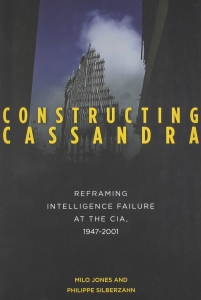
Milo Jones and Philippe Silberzahn
5.0 out of 5 stars Charming, Recommended for Students, August 20, 2014
I found this book, a gift, to be charming and useful. It should certainly be used as a textbook at the national intelligence university and other mainstream schools. I consider this book a hybrid, one that integrates an outsider application of a social constructivist perspective, with an appreciation for selected insider sources who were ostracized at the time but ultimately proven correct when the agency they sought to serve was proven wrong.
The book examines four of CIA's many failures — the Iranian revolution, the collapse of the USSR, the Cuban missile crisis, and the failure to predict 9/11. Noteworthy in the book's findings are that the insularity of the CIA culture, and its lack of language-qualified individuals as well as diversity mindsets (e.g. the feminine point of view in relation to Russian economics) along with its oblivious with respect to ethnic and religious divisions, all tended to lead to the CIA asking and answering the wrong questions.
What I find particularly appealing about this book as a study tool is its review of how CIA failed in each of the key elements of the intelligence cycle (the authors focus on tasking, collection, analysis, and production/dissemination) and their conclusion that missing from the intelligence cycle is a first step, that of Hypotheses.
The book is limited in its sources — the very best authors critical of the CIA are not represented here — and also naive in its assumptions. It fails to understand what Paul Pillar has made so clear in Intelligence and U.S. Foreign Policy: Iraq, 9/11, and Misguided Reform as well as Morton Halperin before him in Bureaucratic Politics and Foreign Policy, which is to say, the policy world is deeply corrupt, deeply ignorant, and not at all interested in the truth even if CIA were capable of getting a grip on the truth.
The book is generally strong on the first three cases, and very weak on the last. 9/11 was allowed to happen. The Director of Central Intelligence at the time, George Tenet, personally aided and abetted the Vice President of the United States, Dick Cheney, in shutting down ABLE DANGER and otherwise squelching warnings — including blocking these warnings from reaching Congress — of 13 other countries. For the best overview of 9/11, including the 13 early warnings that allowed Dick Cheney and his cohort to schedule a national “exercise” three months in advance of the day so as to control everything, search online for Mini-Me: 9/11 Convergence + NEW Information + Comment by Robert Steele + List of Advance Warnings from Over 13 Countries.
The book makes a token attempt to include Open Source Intelligence (OSINT) as a safety net, but is completely oblivious to all of the truly important international authors on this topic (easily found by searching for OSINT Historic Contributions Directory (List)). Their oversight is understandable — these vital works appeared in journals and conferences not indexed by the reference works that academics rely upon. As with CIA, insularity is a handicap.
Those wishing to see my summary reviews of over 300 books on secret intelligence, each review leading back to its Amazon home page, can search online for Worth a Look: Book Reviews on Government Secret Intelligence, the CIA section alone has 70 entries, most not cited by these authors.
On balance a stellar personal effort by two outsiders, at the intersection of cultural failure, source failure, process failure, and political failure.
Best wishes to all,
Robert David Steele
ON INTELLIGENCE: Spies and Secrecy in an Open World (2000)




